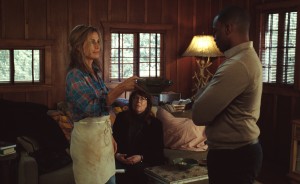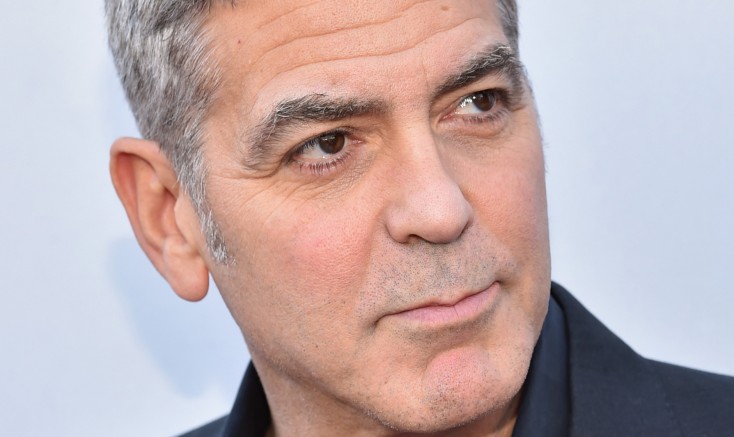
Sandra Bullock and Anthony Mackie star in OUR BRAND IS CRISIS, which is produced by George Clooney. ©Warner Bros. Entertainment/Ratpac-Dune Entertainment LLC.
By ANGELA DAWSON
Front Row Features
HOLLYWOOD—What’s scarier than ghosts, goblins, monsters or zombies? Politicians, some might say.
Just in time for Halloween, movie star turned award-winning producer George Clooney drops a political satire on unsuspecting moviegoers with “Our Brand is Crisis.”
The title stems from a 2005 documentary that revealed modern-day political campaign marketing tactics that showed how strategists, pollsters, advisors and marketers manipulate elections using whatever tools at their disposal. These guns-for-hire aren’t ideals-driven but money-driven. They’ll work for whoever is willing to pay the most for their highly desirable, highly effective skills.
This dramatized version, written by Peter Straghan (“Tinker Tailor Soldier Spy”) and directed by David Gordon Green (“Pineapple Express”), stars Academy Award winners Sandra Bullock (“The Blind Side”) and Billy Bob Thornton (“Sling Blade”) as rival strategists who duke it out (via attack ads, smear campaigns, etc.) in Bolivia during a high stakes presidential campaign. Bullock plays “Calamity” Jane Bodine, a brilliant strategist who has to be lured out of self-imposed retirement to represent a former Bolivian president who wants to reclaim his office. But first she must outsmart her longtime nemesis, Pat Candy (Thornton), whose pocket of dirty tricks seem to have no bottom, who represents a popular challenger.
The film also stars Anthony Mackie, Joaquin de Almeida, Ann Dowd, Scott McNairy, Zoe Kazan and Reynaldo Pacheco as players in this political game.
At a press conference to promote the film, Clooney, who along with frequent collaborator Grant Heslov, produced the political film, said it was a no-brainer casting Bullock, with whom he previously co-starred in “Gravity,” in one of the two key roles. Although the part was originally written for a man, Bullock’s willingness and desire to be part of the project was a convincer.
The Hollywood superstar, who is married to international attorney Amal Alamuddin Clooney, says timing the release of the fun yet thought-provoking film was important.
Q: Did you have it in mind that this film would be coming out right in the middle of an election?
Clooney: No, we had talked about release dates. We knew that we wanted it come out sooner rather than later because we figured as time goes on people were going to get tired of talking about any form of election politics. But that’s about it, the rest of it was just luck.
Q: Did you push for now because it’s early in the campaign?
Clooney: Yeah. Later would not have been as good. People will be angry later. You can just see the anger building as the months go on.
Q: Did you learn anything new about each other?
Clooney: Nope. Sandy and I and Grant (Heslov) have known each other a long time. We have a long history together. I don’t know. We didn’t learn anything else. It’s just always fun to work together. There’s also something kind of great about the idea that when we first met, I was drunk, we literally couldn’t get hired, for the most part. Grant did an episode of “Joanie Loves Chachi” (in a 1982 episode called “Fonzie’s Visit”). But there’s something really fun about being able to experience these years of change in your life and being able to come up and say, “Alright, now we are in the middle of an incredibly creative time in our lives and to have Sandy call up and say, “Well, let’s make this movie. How about if I do it? And I play the part?” and us going, “Well, let’s sit down and figure this out.” That’s really exciting, because when you’re doing guest shot on “Joanie Loves Chachi,” you don’t really think that’s going to be the next thing that happens in your career. It’s a really fun experience that we’ve always had.
Q: Since you and Grant are producers and Sandra is an executive producer, who’s the boss of who?
Clooney: Sandy’s the boss. Honest to God, she’s the boss.
Q: You became a political junkie early in life? Is there anyone in particular person that sparked it?
Clooney: I grew up in a time where you had the civil rights movement and the anti-Vietnam war movement and the drug culture and the assassinations. That was part of your makeup; it was part of your DNA. And then Watergate comes around. From a very early age, we were sort of indoctrinated into the idea of being involved and being socially aware so that by the time we were aware of Mandela and in apartheid in the early 1980’s, when it really started to catch on, that was something that you could get involved in and be a part of. So it was just part of our DNA. You weren’t able to duck into a cell phone or watch TV to get out of it.
Q: What did this movie allow you to do in setting it in Latin America? Are you a fan of political films?
Clooney: Grant and I produced a TV series called “K Street,” where we basically, for 14 weeks, shared an office with Mary Matalin, (her husband) James Carville, Michael Deaver and Stuart Stevens. Mary, at the time, was chief of staff for Dick Cheney. We were in the office when they came in and they taped up our computers—the justice department—because of the Scooter Libby investigation.
We were around watching really interesting things happen on the ground as it was happening. It’s really funny to watch political operatives. It’s really interesting to watch that process, and the behind the scenes conversations. We take things much more personally than they do. These guys could work for other sides, and they do often. Like, I’ll get really angry at something that someone says but a politician won’t be angry at all. It’s part of the game that they play. They’ll go out later and have a drink and laugh about it.
So, it’s so much more fun to watch how it works as an industry—and see that it actually is an industry. It isn’t all just this passionate belief system. I always thought that that was fun, not that Mary and James aren’t passionate about what they believe in, but that there were a lot of people there that really just did things because they liked the idea of money.
Q: Did you ever drop anything that you saw from the political world into one of your political movies?
Clooney: Oh yeah, plenty of things. “The Ides of March” (a 2011 political thriller I directed and starred in) is full of it. We can’t tell you which ones.
Q: Sandra’s character, Jane Bodine, originally was written for a man. Can you talk about turning that role into the female protagonist?
Clooney: There is another part to this, which is that we wanted to work with (her). The minute that she suggested the idea we thought, “Well, this is silly that we would even think that it wouldn’t work.” It made total sense. I think that it’s just a natural progression. It gets talked about a lot lately: Why don’t more roles get switched (gender-wise). There are a lot of roles that could be. It’s mostly women that starred in movies in the 1930s, leading the films. There has been a great change in the mentality since then. Maybe it’s because the studios are mostly run by men. I have no idea. Somewhere in here, everybody looked at their development a little bit and said, “Well, it doesn’t have to be all the guys.” Grant and I develop things because I might want to work on them as an actor, but it doesn’t mean that it has to be me that stars in it. It makes more sense with (Bullock) in it. She’s so wonderful in the part, so there wasn’t a moment of doubt.
Q: This is loosely based on true events. Why did you change the names?
Clooney: We changed the names because we weren’t doing the exact same story. That will get you in trouble any time you keep the real names and change the story. We didn’t change it to disassociate from anybody. We knew if we were going to visualize some pieces of it, we were going to have to change the names, like we did on “Michael Clayton.” In that, it was clearly about a much different industry than what we were doing and it was because we had to change the names. You do that so you don’t get sued a lot.
Q: Do you still believe in politics?
Clooney: Yes, of course I still believe in the political process. I believe that government at its best is designed to look after the people who can’t look after themselves. And I think that that’s our responsibility to hold our government to task for that. I consider that part of each of our responsibilities as citizens. But, yeah, I feel I am always frustrated by it. It moves incrementally forward and sometimes it’s three steps back. I still very much believe in the process and I will continue to be as much a part of it as I can because I’m a citizen of this country.
Q: Will you run for office?
Clooney: No. I have been asked that for almost 20 years now. The answer is just no. Who would ever want to live like that? I’m friends with a lot of those guys. I just think it’s hell. I commend people who go into public service because it’s just such a horrible way to get elected. It’s such a horrible time while you’re in office. It’s more polarized now, arguably, since the Civil War, in many ways. I think that the same people will argue over things that they believed in six or eight years ago, because it’s not their guy saying it. No, I wouldn’t want to be in politics because I have no interest in it. I have every interest in being involved on the outside and trying to get things done that are important to me, and the things I care about.
Q: What’s your coping mechanism for disillusionment?
Clooney: (quips) Drinking.
Q: Is it difficult to make this kind of film?
Clooney: It’s a lot easier when you get Sandy in there. It’s always very hard to make a film. You’ve got to keep the budgets down on these things. You have to work really quickly. And you have to try to get it finished before everyone figures out what you are doing. That’s the job. Remember that films aren’t designed to lead; films reflect on things. It takes you two years to make a film. We are reacting to things that have already happened before and holding a mirror up to society saying, “This is what happened.” It’s a record of what we’ve been doing. So, our job isn’t to tell people what to do; it’s to have them reflect and say, “This is what you did. Isn’t that interesting?” It’s social, at times. It’s political, at times, although that’s not necessarily our whole M.O. We try to entertain. We’ve done a few political films. “Good night and Good Luck is pretty overtly political film. We’ve done quite a few that were focused on entertaining.





